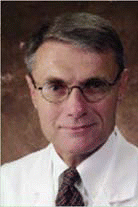G. Richard Holt, MD, MSE, MPH, is Professor and Program Director of the Department of Otolaryngology-Head and Neck Surgery at the University of Texas Health Science Center in San Antonio.
Explore This Issue
May 2007Colonel, Medical Corps, Flight Surgeon, Texas Army National Guard, Brigade Surgeon, 36th Combat Aviation Brigade, Camp Anaconda, Iraq
This is a short narrative of the experience of this otolaryngologist, who was deployed to Iraq to participate in Operation Iraqi Freedom. My experience was somewhat different from that of Colonel Brennan, but not uncommon to generations of otolaryngologists who have served in a war or conflict in a position other than this specialty. Individuals such as Drs. Jack Hough, Ted Cook, Roger Crumley, and Christopher Post come to mind as examples of dedicated otolaryngologists who were at war in another position—I cannot list all those who have served.
Like Dr. Brennan, I have been a flight surgeon in the military (he in the Air Force, I in the Army) for several decades. In this capacity I have served with airborne and special forces units, medevac units, the US Space Command, and NASA. When I was recalled to active duty in the summer of 2006 and mobilized for duty in Iraq, I had no misgivings about the mission, but was sorry that my family and my colleagues would have to carry a heavy load in my absence. They helped me tremendously, and I publicly acknowledge my appreciation to them.
I was assigned as the Brigade Surgeon for the 36th Combat Aviation Brigade, a unit of the 36th Infantry Division. I had no prior contact with this unit, but understood it had been significantly augmented to a force of nearly 3000 airmen and soldiers from 44 states. It would prove to be an interesting challenge to organize and manage the medical assets of so many diverse units and personnel. Although the brigade composition was like a patchwork quilt, the brigade commander, an aviator and attorney, was a strong and competent leader and unit cohesiveness was achieved.
I met the brigade in Kuwait—at a staging camp there. The bulk of the brigade had been training at Fort Hood, TX, for six months prior to deployment, so I needed to get up to speed quickly with the others. In Kuwait, we experienced one of the hottest locations on earth—138 degrees and sunny! In fact, it felt like a blast furnace, and I never got used to it. The sandstorms were so forceful that my protective goggles were pitted by the particle blasts. It was there that I became acquainted with the flight surgeons, aeromedical physician assistants, and the flight medics whom I would need to bring together into an efficient and effective medical asset team.

Leave a Reply